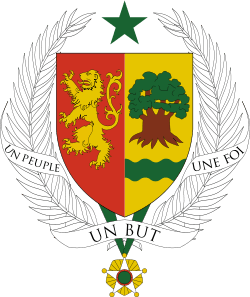Senegalese parliamentary election, 2001
 |
| This article is part of a series on the politics and government of Senegal |
|
|
Government |
An election for the National Assembly of Senegal was held on 29 April 2001. The election was held under the new constitution approved by referendum earlier in the year. Following the victory of Abdoulaye Wade in the February-March 2000 presidential election, the Sopi Coalition, including Wade's Senegalese Democratic Party and its allies, won a large majority.
After Wade was elected President, he entered a situation of cohabitation with the Socialist Party, which still held an overwhelming majority of seats in the National Assembly. Wade was constitutionally barred from dissolving the National Assembly and calling a new parliamentary election, but he decided to revise the constitution and said that he would not pursue policy initiatives in the meantime. Since he was not seeking new legislation, he did not need to compromise with the National Assembly, which simply approved the budget and adjourned. The Socialist Party did not object to Wade's constitutional changes, which included giving the President the right to dissolve the National Assembly, and the new constitution easily passed a referendum in January 2001. Wade then dissolved the National Assembly and called a new parliamentary election. The Socialist-controlled upper house of Parliament, the Senate, was abolished by the referendum.[1]
Although Wade was barred by the January 2001 Constitution from addressing rallies during the election campaign[2] and the Sopi Coalition was not allowed to use his picture on its ballot papers,[3] Wade actively and prominently participated in the Sopi campaign, drawing criticism from opponents.[3][4] Wade urged the people to vote for the Sopi Coalition so that he could govern effectively with a secure majority.[1]
Election result
| Parties | Votes | % | Seats | |
|---|---|---|---|---|
| Coalition Sopi | Senegalese Democratic Party (Parti Démocratique Sénégalais) | 931,617 | 49.6 | 89 |
| Democratic League - Movement for the Labour Party (Ligue Démocratique-Mouvement pour le Parti du Travial) | ||||
| Others | ||||
| Alliance of Progress Forces (Alliance des Forces du Progrès) | 303,150 | 16.1 | 11 | |
| Socialist Party of Senegal (Parti socialiste du Sénégal) | 326,126 | 17.4 | 10 | |
| Union for Democratic Renewal (Union pour le renouveau démocratique) | 69,109 | 3.7 | 3 | |
| And-Jëf/African Party for Democracy and Socialism (And-Jëf/Parti Africain pour la démocratie et le socialisme) | 76,102 | 4.1 | 2 | |
| Senegalese Liberal Party (Parti libéral sénégalais) | 17,240 | 0.9 | 1 | |
| Party for Progress and Citizenship (Parti pour le progrès et la citoyenneté) | 17,122 | 0.9 | 1 | |
| Alliance for Progress and Justice Jëf-Jël (Alliance pour le Progrès et la Justice/Jëf-Jël) | 15,048 | 0.8 | 1 | |
| National Democratic Rally (Rassemblement National Démocratique) | 13,286 | 0.7 | 1 | |
| Party of Independence and Labour (Parti de l'Indépendance et le Travail) | 10,854 | 0.6 | 1 | |
| Others | 99,192 | 5.3 | 0 | |
| Total (turnout 67.4 %) | 120' | |||
| Source: Le Soleil | ||||
References
- 1 2 Marina Ottaway, Democracy Challenged: The Rise of Semi-Authoritarianism (2003), Carnegie Endowment, pages 104–106.
- ↑ "Senegal's president hopes to consolidate power in legislative vote", Associated Press (nl.newsbank.com), April 29, 2001.
- 1 2 Chris Simpson, "Senegal: Wade's historic turnaround", BBC News, May 2, 2001.
- ↑ "Senegal: President's criticized for involvement in electoral campaign", Radio France Internationale (nl.newsbank.com), April 27, 2001.